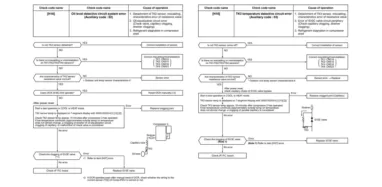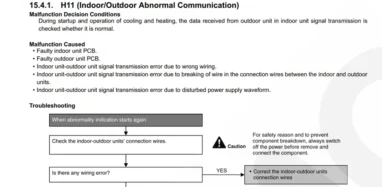When people start searching about HVAC systems for their homes or offices, they can get stuck in a messy world as there are plenty of options and different kinds of HVAC units available in the market. They have to know about all the products and their features so that they can compare them with the related products and also determine which system is meeting their requirements and specifications in the most appropriate manner.
You may know about various HVAC units and their types but while looking at the list, you may ask, what is FCU in an HVAC system? Well, this is quite a thing to know about and this complete guide is all that you should know about FCU in HVAC.
What does FCU stand for in HVAC
FCU stands for Fan Coil Unit which can give you an idea of what kind of HVAC system it will be. It is one of the best and widely used units when it comes to mounting the HVAC systems in the ceiling or floor.
Not just to be mounted in compact places but FCU also comes in varying configurations where freestanding is probably the most demanded one.
People and manufacturers from all around the world are considering FCU for their HVAC systems because of their convenience and high efficiency.
What is FCU
A Fan Coil Unit is a component, device, or unit that can provide cooling or heating for a room without requiring any connection to the duck work. All the process in FCU is done with the combined working of a fan and coils.
It is like the air rotating in the room moves over the coils that are either hot or cold. The air during the passage gets the same temperature and then comes back to the indoor environment.
This consistent and continuous process of air rotating makes the room temperature suitable for the residents. One of the major reasons behind preferring FCU over ducted HVAC systems is that they are fairly less costly and can bring efficient permanence as well
How does an FCU work
The basic mechanism of an FCU is just like a normal HVAC as it also starts the process by sucking air from the indoor environment into an empty space inside the unit. This air is then transferred over coils which are either hot or cold depending on user requirement.
After a complete cycle of air over the coils, it is blown back to the indoor environment of your room. When the air comes out of the unit, it is cold or hot which can easily change the temperature of your room just like any other HVAC system.
Do keep this fact in mind the Fan Coil Unit is just a simple shaped system that consists entirely of a fan and coils. The air circulates between these two components without any hard-to-understand or complex procedure. FCU can operate flawlessly without requiring an excessive amount of ductwork or other related equipment.
The central part of fan coil units has a cooling tower or boilers that circulate hot or cold water in the system. This is a major mechanism that is used to mitigate or increase the temperature to keep it suitable for the residents.
Why do we use FCU in HVAC
In many buildings there are small spaces like shops, offices, or any other small areas where putting a full-fledged air conditioner is not a good option. FCU is considered the best HVAC product to be used in such small private places.
As a general measure, a single fan coil unit can provide cooling or heating to a place of about 150 square meters which is not that large. FCU allows building owners and residents to install these small units as much as they can while some major buildings have hundreds of fan coil units.
While FCUs are used in HVAC for small places, most people now use them as equipment to enhance the performance of an air conditioner. FCUs are used as supplements for the air conditioner while they are blowing cool air through the ductwork.
Types of FCU
Fan Coil Units are usually divided into four main categories such as:
- Vertical FCUs
- Underfloor FCUs
- Horizontal exposed FCUs
- Horizontal chassis FCUs
Talking about their features and specifications, almost all these different kinds of FCUs provide the same performance and outcomes. The units are categorized to fit changing building requirements and specifications.
Types of FCU thermostats
Thermostats are the controls that allow users to change settings and set temperature and other factors of fan coil units to meet their requirements. The three most common and widely used FCU thermostat types are briefly explained below:
Manual FCU thermostat
These are probably the oldest and most basic types of thermostats. They are usually consistent with buttons labeled with signs. All the settings of a fan coil unit in HVAC are controlled by pushing different buttons or their combinations.
Non-programmable FCU thermostat
These are the next advancement of manual thermostats but are a lot like them. You need to perform all actions and set all settings manually. The only difference is that their display is different while some have touch screens as well.
Programmable FCU thermostat
Programmable FCU thermostats are the most advanced ones as a user can control all heating, cooling, and other HVAC settings by programming the device by themselves. It means that users have the option to schedule startup or shut-down time, set the auto mode to change the temperature accordingly, and various other features like that.
Types of FCU filters
Filters in FCUs are installed to protect the coils from dust particles and prevent the buildup of debris which can eventually affect its performance. Dust buildup will not only make it dull in its working but will surely increase energy consumption and utility bills as well. The most popular and best suitable FCU filters include:
- Flat Paneled Fiberglass Filters
- Reusable Air Filters
- HEPA Filters
- Pleated Media Filters
Types of FCU flexible connectors
Flexible connectors are essential to form a connection between different parts of FCU in HVAC especially to connect water piping hose with mechanical equipment. It is mainly made up of stainless steel and is generally referred to as a braided elastomeric hose as well. Various types of FCU flexible connectors are further divided into various versions and models, some of the main kinds include:
- Single Sphere Connector (FC)
- Twin Sphere Connector (FTC)
- Molded Teflon Connector (KMC)
- Wide-Arch Connector (KWA)
- BFMC-FFF
- BFMC-MTE
- BFMC-GE
- BFMC-CFE
What is the difference between FCU and AHU?
- AHU has a lot of things that differ from FCU as an AHU is an air handling HVAC system while FCU includes multiple systems such as heating, cooling, air conditioning, ventilating, etc.
- FCU has the ability to work on its own without being connected to any other equipment while AHU needs to be connected to a central HVAC system.
- Due to the above-mentioned reason, an AHU has the ability to serve a whole big building or a large place while an FCU can only be used for small or medium size spaces.
- Due to their sizes, FCU sucks indoor air and circulates to change room temperature while an AHU has to take a lot of air from the outdoor environment and then throw it inside the building after processing.
- FCU has no intense ductwork while AHU has a lot of such things attached to its system for circulation purposes.
- When it comes to features and different functionalities, AHU has an upper edge while a fan coil unit can only perform its simple intended function.
Fan coil unit selection guide
- Start by measuring the place where FCU will be installed and then determine the capacity necessary to meet the heating or cooling requirements of your room or office.
- While selecting an FCU, it is necessary to have a look at whether the unit is equipped with a fan motor that uses an oil shaft pump. If so, you may need to add oil on a regular periodic basis.
- Have a clear look at the direction of the water consumption pipe whether it goes left or right.
- For cooling fan coil units, make sure that the temperature of coils doesn’t go down the 5 degrees celsius as it can cause the water to condense and may cause issues as well.
- For a heating FCU unit, the temperature of coils should not exceed more than 50 to 60 degrees celsius; it will also not be good for the system and room as well.
- Select a fan coil unit in which all the things are installed properly. It is highly recommended to have an FCU that includes a valve on the highest part of the coil.
Always keep this fact in mind that you should prefer quality over price as having a perfect FCU unit of high quality may cost a little bit more than cheap units but will eventually save a lot of your expenses that were to be spent on its maintenance and repair.
Are you interested to learn what does fau stand for in hvac or what is the plenum in hvac too?


